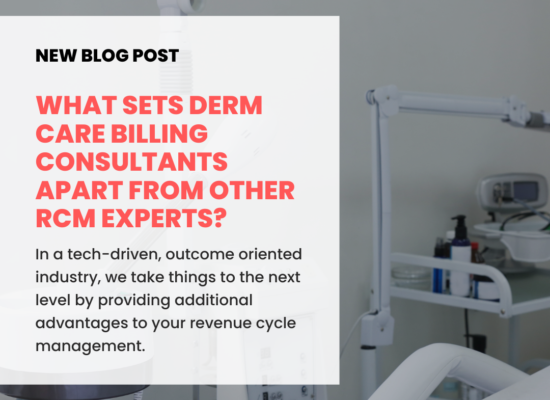Do you need help with writing a medical collections letter for dermatology?
No doubt as a dermatologist your primary focus is on skin care, patient health and managing disease, disfiguration and ongoing skin conditions that require maintenance treatments and monitoring. This makes perfect sense right? What you may not have spent time preparing for while in medical school is how to get paid for your services, promptly and in full. The unfortunate reality, however, is that whether it is from a patient, their insurance provider or a third party, you may well need to send multiple requests to be paid for services, particularly if there are any charges in dispute. Here are some suggestions on how to move your collections process from collections letters that simply gather dust to writing a medical collections letter that actually collect your cash.
1. Extend Consideration Before Collection
Let’s first address the “elephant in the room.” It’s hard to send any kind of a sternly worded demand letter to your own patient. You have seen them at their most vulnerable, and sometimes at their weakest, particularly if they are receiving treatment for an ongoing and/or debilitating illness. That feeling still exists for your patient long after they have had their procedure and simple avoidance of having to deal with anything to do with their ailment might play a role in your inability to collect payment. Consider these when writing a medical collections letter:
- Is the person very likely still quite ill, not dealing with bills and payments or not able to pay because they are off work and not receiving any benefits?
- Are you able to provide some type of repayment schedule, with or without an interest penalty? If so, it makes it more likely you‘ll be able to collect at least some of the money you are owed.
- Is it possible the patient has no idea you haven’t been paid? Perhaps they believed insurance was covering the full cost of their procedure?
- Has the patient moved or is it possible your office administrator made a mistake in the mailing address?
- In other words, make every effort to ensure there isn’t a reasonable excuse that your invoice has not yet been paid before sending a curtly worded demand notice. You may even try picking up the phone first to connect with the non-payer to rule out any obvious and easily resolved reasons for the lack of payment.
2. The Invoice is Legitimately Overdue, Now What Do You Do?
If a phone call hasn’t worked and you’ve ruled out some of the other possible reasons for non-payment, try starting with a “Gentle Reminder.” This sample letter to your patient regarding their balance might look a little something like this:
|
Date: Dear “Patient,” It has come to our attention that an invoice for services provided on “date,” remains unpaid. Kindly check your records and if payment was issued, contact our offices to confirm the details. If you have not yet had the opportunity to send payment, or if you have any questions or concerns about the outstanding amount, we would be happy to discuss those concerns with you and invite you to call or email our office during regular business hours. For your convenience we also offer payment plan options should you be experiencing any financial challenges that make paying your entire invoice challenging at this time. Thank you for your continued trust in our clinic as your patient care provider. Sincerely, Dr. “Smith” |
After “Gentle” comes a second letter, this one perhaps a little more stern although we strongly recommend avoiding any actual warnings – especially ones you have no real intention of following through on or that might be perceived by the receiver as genuinely threatening. You may wish to send this letter after 45 days of non-payment. You might call this one a “Reminder Notice,” or “Notice of Non-Payment for Services”
The language for this letter may still reference the date services were provided and perhaps even confirm for your patient what, if any, their insurance coverage may have helped contribute toward the costs. Your “friendly” reminder might also state the possible consequences of inaction, for example: “If you are unable to process payment at this time due to financial, medical or other reasons, contact our offices immediately to discuss how we can help. If we have not heard from you within the next 30 days we may have no choice but to mark your account as “not in good-standing and this may inhibit your ability to receive further treatments.” For someone who is receiving ongoing care, this might be enough to prompt at least a discussion on the matter with your office.
3. Other Considerations when Writing a Medical Collections Letter
- Throughout this process remember to document every attempt to reach your patient, whether by phone, email or even text message.
- Build a paper trail to prove that you’ve been attempting to reach out to them.
- Before a third, or any final notice goes out, check your own records one more time. You certainly don’t want to be accused of harassment.
- You may wish to ensure your patient is not deceased or in hospital.
- You may wish to look at your own in-house collections processes to identify opportunities for efficiencies. For example, review your front-end office procedures to ensure your staff is doing a complete and thorough patient intake. Problems in payment often arise due to simple errors in the inaccurate collection of information right from the start.
- Finally, once again, you might even want to verify against any insurance coverage and check for coding errors at your end to see if the full eligible amount of the claim has been paid before attempting to collect from your patient.
It’s worthwhile to try a final notice before sending the matter to a collections agency who will, after all, take a portion of any monies collected. More and more the research shows that people who are delinquent in payments respond less favourably to threats. Some habitual offenders are not in the least worried about a threat to turn the matter over to a collections agency or a lawyer. The prevailing wisdom is that it’s still better to give the individual one last opportunity to “save face,” and do the right thing. This medical debt collection letter can still take on a more authoritative tone but threats are often meaningless.
4. Consider language such as:
- We have now sent (x) payment reminders for your recent treatment of (x) on (date.)
- Be specific so people know exactly what you are asking payment for.
- Give them the option to dispute the charge. This might encourage a phone call to your offices for clarification at which time you can make a personal appeal for payment.
- Remind them again that you are open to considering repayment options through instalments and express concern that you would not want to see their “credit rating harmed” due to an outstanding debt.
- These are all nicer ways of saying outright “Pay us, or else!”
Finally, it’s also worth noting that today’s younger adults are used to faster, more efficient methods of payment. Often they use their phones for just about everything, including paying outstanding balances while in your office. Perhaps they simply forgot to pay on the way out? Perhaps you are not yet set up to accept mobile payments? These patients often also don’t use or respond to the more traditional “snail mail” approach to collections and a text message reminder might be more appropriate for reaching out.
The business of collections has changed. Medical providers like dermatology specialists deal with a wide variety of procedures from cosmetic to cancerous tumors. Billing can be complicated and coding a challenge. Add collections to the list of things to do and it might start to feel overwhelming. Utilizing the services of a team of billing professionals, like the team at Derm Care Billing Consultants helps you manage your paperwork, processes and payments. We may even identify opportunities to streamline that help prevent the need for ongoing collections letters. Consider contacting us to ask how we can help with writing a medical collections letter.





